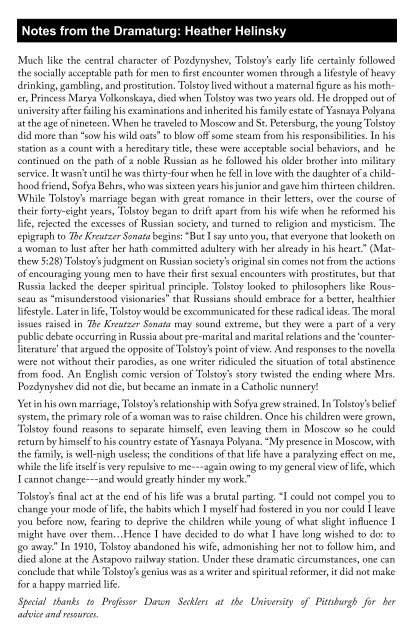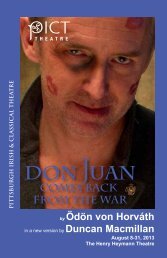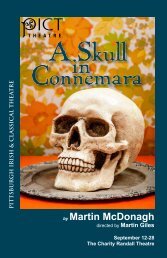download the program book - Pittsburgh Irish & Classical Theatre
download the program book - Pittsburgh Irish & Classical Theatre
download the program book - Pittsburgh Irish & Classical Theatre
You also want an ePaper? Increase the reach of your titles
YUMPU automatically turns print PDFs into web optimized ePapers that Google loves.
Notes from <strong>the</strong> Dramaturg: Hea<strong>the</strong>r HelinskyMuch like <strong>the</strong> central character of Pozdynyshev, Tolstoy’s early life certainly followed<strong>the</strong> socially acceptable path for men to first encounter women through a lifestyle of heavydrinking, gambling, and prostitution. Tolstoy lived without a maternal figure as his mo<strong>the</strong>r,Princess Marya Volkonskaya, died when Tolstoy was two years old. He dropped out ofuniversity after failing his examinations and inherited his family estate of Yasnaya Polyanaat <strong>the</strong> age of nineteen. When he traveled to Moscow and St. Petersburg, <strong>the</strong> young Tolstoydid more than “sow his wild oats” to blow off some steam from his responsibilities. In hisstation as a count with a hereditary title, <strong>the</strong>se were acceptable social behaviors, and hecontinued on <strong>the</strong> path of a noble Russian as he followed his older bro<strong>the</strong>r into militaryservice. It wasn’t until he was thirty-four when he fell in love with <strong>the</strong> daughter of a childhoodfriend, Sofya Behrs, who was sixteen years his junior and gave him thirteen children.While Tolstoy’s marriage began with great romance in <strong>the</strong>ir letters, over <strong>the</strong> course of<strong>the</strong>ir forty-eight years, Tolstoy began to drift apart from his wife when he reformed hislife, rejected <strong>the</strong> excesses of Russian society, and turned to religion and mysticism. Theepigraph to The Kreutzer Sonata begins: “But I say unto you, that everyone that looketh ona woman to lust after her hath committed adultery with her already in his heart.” (Mat<strong>the</strong>w5:28) Tolstoy’s judgment on Russian society’s original sin comes not from <strong>the</strong> actionsof encouraging young men to have <strong>the</strong>ir first sexual encounters with prostitutes, but thatRussia lacked <strong>the</strong> deeper spiritual principle. Tolstoy looked to philosophers like Rousseauas “misunderstood visionaries” that Russians should embrace for a better, healthierlifestyle. Later in life, Tolstoy would be excommunicated for <strong>the</strong>se radical ideas. The moralissues raised in The Kreutzer Sonata may sound extreme, but <strong>the</strong>y were a part of a verypublic debate occurring in Russia about pre-marital and marital relations and <strong>the</strong> ‘counterliterature’that argued <strong>the</strong> opposite of Tolstoy’s point of view. And responses to <strong>the</strong> novellawere not without <strong>the</strong>ir parodies, as one writer ridiculed <strong>the</strong> situation of total abstinencefrom food. An English comic version of Tolstoy’s story twisted <strong>the</strong> ending where Mrs.Pozdynyshev did not die, but became an inmate in a Catholic nunnery!Yet in his own marriage, Tolstoy’s relationship with Sofya grew strained. In Tolstoy’s beliefsystem, <strong>the</strong> primary role of a woman was to raise children. Once his children were grown,Tolstoy found reasons to separate himself, even leaving <strong>the</strong>m in Moscow so he couldreturn by himself to his country estate of Yasnaya Polyana. “My presence in Moscow, with<strong>the</strong> family, is well-nigh useless; <strong>the</strong> conditions of that life have a paralyzing effect on me,while <strong>the</strong> life itself is very repulsive to me---again owing to my general view of life, whichI cannot change---and would greatly hinder my work.”Tolstoy’s final act at <strong>the</strong> end of his life was a brutal parting. “I could not compel you tochange your mode of life, <strong>the</strong> habits which I myself had fostered in you nor could I leaveyou before now, fearing to deprive <strong>the</strong> children while young of what slight influence Imight have over <strong>the</strong>m…Hence I have decided to do what I have long wished to do: togo away.” In 1910, Tolstoy abandoned his wife, admonishing her not to follow him, anddied alone at <strong>the</strong> Astapovo railway station. Under <strong>the</strong>se dramatic circumstances, one canconclude that while Tolstoy’s genius was as a writer and spiritual reformer, it did not makefor a happy married life.Special thanks to Professor Dawn Secklers at <strong>the</strong> University of <strong>Pittsburgh</strong> for heradvice and resources.Bravo!UPMC Health Plan is proud to support <strong>the</strong><strong>Pittsburgh</strong> <strong>Irish</strong> & <strong>Classical</strong> <strong>Theatre</strong>.





